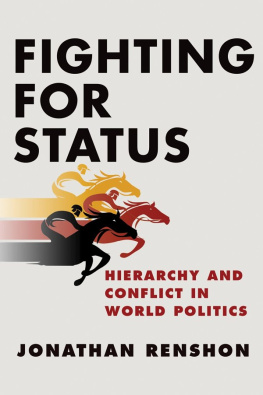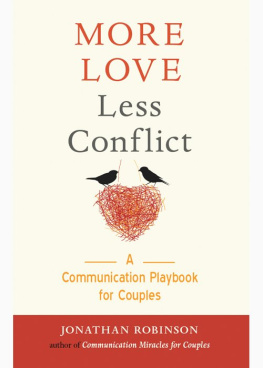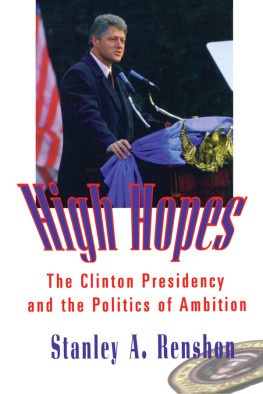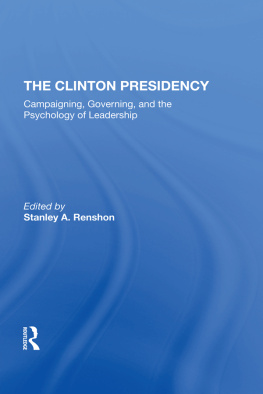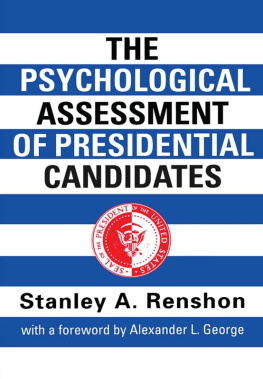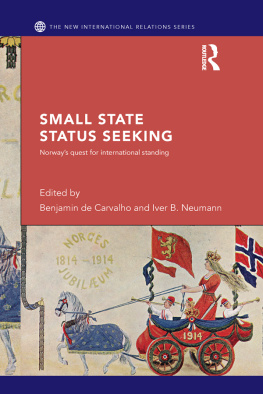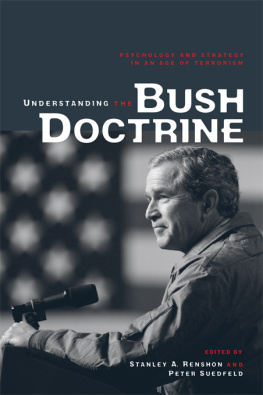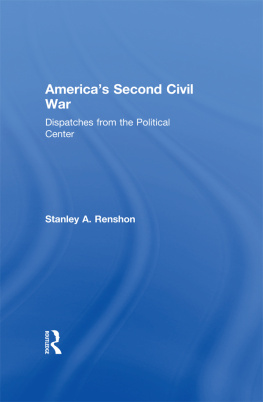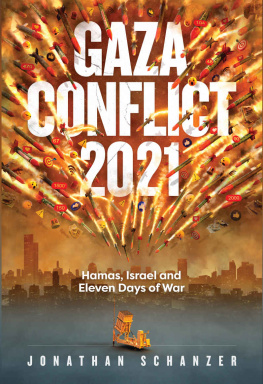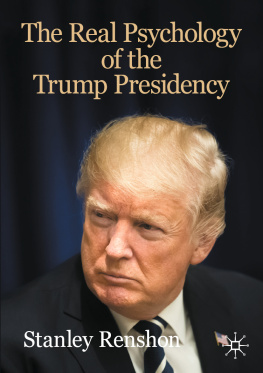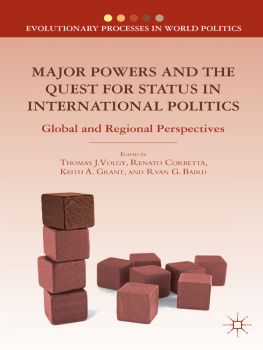Jonathan Renshon - Fighting for Status: Hierarchy and Conflict in World Politics
Here you can read online Jonathan Renshon - Fighting for Status: Hierarchy and Conflict in World Politics full text of the book (entire story) in english for free. Download pdf and epub, get meaning, cover and reviews about this ebook. year: 2017, publisher: Princeton University Press, genre: Politics. Description of the work, (preface) as well as reviews are available. Best literature library LitArk.com created for fans of good reading and offers a wide selection of genres:
Romance novel
Science fiction
Adventure
Detective
Science
History
Home and family
Prose
Art
Politics
Computer
Non-fiction
Religion
Business
Children
Humor
Choose a favorite category and find really read worthwhile books. Enjoy immersion in the world of imagination, feel the emotions of the characters or learn something new for yourself, make an fascinating discovery.
- Book:Fighting for Status: Hierarchy and Conflict in World Politics
- Author:
- Publisher:Princeton University Press
- Genre:
- Year:2017
- Rating:3 / 5
- Favourites:Add to favourites
- Your mark:
- 60
- 1
- 2
- 3
- 4
- 5
Fighting for Status: Hierarchy and Conflict in World Politics: summary, description and annotation
We offer to read an annotation, description, summary or preface (depends on what the author of the book "Fighting for Status: Hierarchy and Conflict in World Politics" wrote himself). If you haven't found the necessary information about the book — write in the comments, we will try to find it.
Fighting for Status: Hierarchy and Conflict in World Politics — read online for free the complete book (whole text) full work
Below is the text of the book, divided by pages. System saving the place of the last page read, allows you to conveniently read the book "Fighting for Status: Hierarchy and Conflict in World Politics" online for free, without having to search again every time where you left off. Put a bookmark, and you can go to the page where you finished reading at any time.
Font size:
Interval:
Bookmark:
Fighting for Status
Fighting for Status
HIERARCHY AND CONFLICT IN WORLD POLITICS
Jonathan Renshon
PRINCETON UNIVERSITY PRESS
PRINCETON AND OXFORD
Copyright 2017 by Princeton University Press
Published by Princeton University Press, 41 William Street,
Princeton, New Jersey 08540
In the United Kingdom: Princeton University Press, 6 Oxford Street,
Woodstock, Oxfordshire OX20 1TR
press.princeton.edu
All Rights Reserved
Library of Congress Cataloging-in-Publication Data
Names: Renshon, Jonathan, 1982 author.
Title: Fighting for status : hierarchy and conflict in world politics / Jonathan Renshon.
Description: Princeton, New Jersey : Princeton University Press, 2017. | Includes bibliographical references and index.
Identifiers: LCCN 2016050191 | ISBN 9780691174495 (hardback : alk. paper) | ISBN 9780691174501 (paperback : alk. paper)
Subjects: LCSH: International relationsPhilosophy. | Balance of power. | Great powers. | BISAC: POLITICAL SCIENCE / International Relations / General. | POLITICAL SCIENCE / International Relations / Diplomacy. | POLITICAL SCIENCE / Public Policy / General. | POLITICAL SCIENCE / Government / International. | PSYCHOLOGY / Social Psychology.
Classification: LCC JZ1310 .R46 2017 | DDC 327.101dc23 LC record available at https://lccn.loc.gov/2016050191
British Library Cataloging-in-Publication Data is available
This book has been composed in Sabon Next LT Pro
Printed on acid-free paper.
Typeset by Nova Techset Pvt Ltd, Bangalore, India
Printed in the United States of America
1 3 5 7 9 10 8 6 4 2
To my favorite, my fiance,
Michelle
Contents
Illustrations
Tables
Acknowledgments
I think that the popular image of book writing is that one locks themselves away in archives or offices for several years, and then emergesbedraggledwith a polished manuscript ready for printing. That may capture the process sometimes (at least the bedraggled part) or for some people, but it does not come close to describing my situation. I absolutely could and would not have finished this project without the help of those listed below, making this effort far more reliant on others than most would imagine, and certainly more than I predicted. I am also sure to accidentally omit some who deserve thanks, too, for which I apologize.
This book, like most first books, started as a dissertation, and so Id like to begin by thanking the members of my committee: Steve Rosen, Iain Johnston, and Rose McDermott. Steve served as the chair of my committee, and I was lucky to have an adviser who was so open to new approaches and methods. I always enjoyed our talks and left his office full of ideas. Iain was a great mentor to me throughout graduate school, and was always up for a helpful chat about my work or career. Despite being located in another state, Rose was available for a discussion, or to read and provide comments on work that I wasnt sure about (and there was a lot that I was unsure about in graduate school) whenever I needed it. She was, of course, particularly helpful in thinking through how experimental research would fit into my project. The translation of that last sentence for any nonacademics reading this is: she talked me out of a lot of bad ideas. Needless to say, all of my advisers endured many, many questions (and requests for letters of various kinds), and did so with good cheer. Not all graduate students are lucky enough to have advisers who are so helpful and whose working style fits with their own.
The lab experiment reported in , including Irving Dominguez, Mark Edington, James Gross, Yoel Inbar, Eric Mattison, Chris Oveis, and Ting Zhang,
Several organizations supported the book project financially over the past several years. I would like to thank the Belfer Center for Science and International Affairs for hosting me as a predoctoral fellow at the Harvard Kennedy School, and the many students and professors who attended those workshop, offering fantastic advice and comments. A special thanks to Susan Lynch, Steve Miller, Sean-Lynn Jones, and Steve Walt, who do a wonderful job running a successful and helpful seminar series and fellowship program. During the projects development, the US Institute of Peace (and US taxpayer) brought me to Washington, DC, for two helpful conferences. Those conferences were greatly enriched by my smart and thoughtful colleagues in the Jennings Randolph Peace Scholar program.
I want to extend a special thank you to the Miller Center of Public Affairs at the University of Virginia, which was generous enough to fund my research through the Governing America in a Global Era fellowship program. Brian Balogh, who directs the program, has done a fantastic job creating a fellowship that truly leaves students better off than it finds them; the content of the dream mentor program more than makes up for the slightly cheesy name. It was through that program that I was paired with Bill Wohlforth, who has been a wonderful mentor. A huge thank you to Bill, who read and commented on many drafts, invited me to a stimulating conference (which produced a wonderful book that he coedited), talked with me in depth at many stages of the project, and basically did whatever he could do to help me. I certainly didnt expect to come out of the Miller Center fellowship with a mentor, but I am grateful that I did.
The Institute for Quantitative Social Science at Harvard, Tobin Project (through a National Security Graduate Fellowship), Smith-Richardson Foundation (through a World Politics and Statecraft Dissertation Fellowship), Program on Negotiation at Harvard Law School (through a Next Generation Grant), and Mind/Brain/Behavior Initiative at Harvard University all provided additional financial support.
I received support for my entire graduate career from both the Department of Government and Graduate School of Arts and Sciences at Harvard. Needless to say, without that support over the many years, this project would not have gotten far. A special thank you to Thom Wall, the department administrator for GOV. Department administrator does not come close to adequately describing what Thom does. Without him, the department (and particularly the graduate students) would just fall apart. Despite being accosted by students basically every minute of every day, Thom is unfailingly generous with his time, and extraordinarily nice even when he should have been throwing things at us.
I think my experience in graduate school was the same as most: while we present our work every once in a while, and meet with advisers to make sure we are on the right track, much of the day-to-day work involves pestering friends to read something we just wrote or discuss an idea we just had. Im lucky in this respect to have had great friends, all of whom helped at every stage in the project, from the initial idea to the final draft. More specifically, thank you to Matt Blackwell, Andrew Coe, Jenn Larson, Rich Nielsen, and Iain Osgood. Jane Vaynman and Vipin Narang deserve particular thanks, as excellent friends, but also as those who were forced to endure the brunt of this; they may be the only people as excited as I am that this book is complete.
I would also like to thank a host of collaborators and friends. Both Dustin Tingley and Arthur Spirling provided advice on the dissertation and job market at critical times. Though both are extraordinarily productive and busy, they were always generous with their time, and I stopped into their offices or e-mailed them with questions countless times. In every case, they helped me, and this manuscript (and my work in general) has benefited tremendously from their thoughtfulness and rigor. My work with Allan Dafoe and Paul Huth has greatly informed my thinking on both status and reputation, much to my benefit (and this books). Allan, in particular, was a model of precision in thinking through the thorny conceptual issues that formed the basis of our review article. Josh Kertzer has been an excellent coauthor and friend, providing feedback whenever asked, making helpful suggestions, and generally playing into the stereotype of the unbelievably helpful and friendly Canadian. All these colleagues and friends have made this work better, and this process more enjoyable.
Next pageFont size:
Interval:
Bookmark:
Similar books «Fighting for Status: Hierarchy and Conflict in World Politics»
Look at similar books to Fighting for Status: Hierarchy and Conflict in World Politics. We have selected literature similar in name and meaning in the hope of providing readers with more options to find new, interesting, not yet read works.
Discussion, reviews of the book Fighting for Status: Hierarchy and Conflict in World Politics and just readers' own opinions. Leave your comments, write what you think about the work, its meaning or the main characters. Specify what exactly you liked and what you didn't like, and why you think so.

